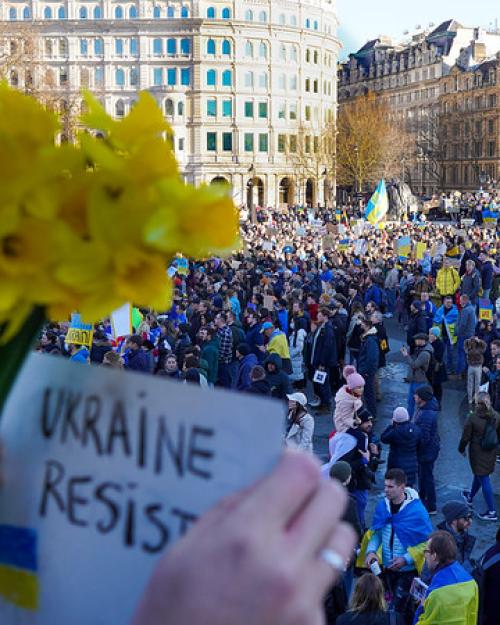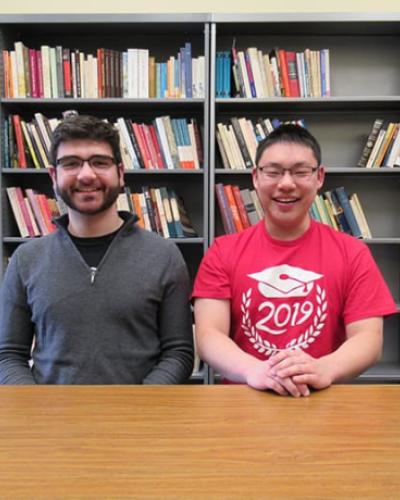History’s Undergraduate Association: Cornell Historical Society
An interview with Ephraim Gau and John Sullivan Baker.The Cornell Historical Society (CHS) has been in existence since 2011. There are currently seven highly-engaged members on the Executive Board. On January 30, the department spoke with Ephraim Gau and John Sullivan Baker who are currently co-presidents.
The CHS promotes history through four key activities: the History Advisor Program (peer advising), Ezra's Archives (an undergraduate peer-review history journal), Community Engagement (movies and faculty dinners), and a Speaker Series.
1. Q: I understand that the History Advisor Program strives to do peer advising with other students interested in History. When do you meet and how do you get the word out to students about the program?
Ephraim: Students learn about the History Advisor Program through their peers and professors—essentially, by word-of-mouth. Participation in the History Advisor Program enables students to form a personal bond with other students.
Students can contact us through email to request an advisor or to become an advisor. Kaamiya Hargis is currently our Advising Director. If a student is interested in being an advisor, we will provide all the proper training. If a student wants to receive advice, we will also be able to quickly connect them to an advisor. (This is the link to our website, should interested students want to learn more: http://history.cornell.edu/history-advisor-program)
Q. How does the program work?
Ephraim: The advisor guides the student through questions they have about history, courses they may enjoy based on their interests, and—in the case of freshmen—how to navigate Cornell. The students and advisors meet on an as-needed basis. There is no set number of meeting times; we leave it up to the individuals.
Q. What type of information do History Advisors share with their student peers about history courses and the program?
Ephraim/John: We guide students concerning selecting history classes and/or answering questions about the major or minor. Since it is often freshmen in this program, we also provide tips on how to best make the most of their time at Cornell. We let them know that we have been in their shoes, that they are not alone, and that with time they will get to know the Cornell community and thrive on all that the university has to offer.
2. I notice Ezra’s Archives is on your webpage at history.cornell.edu/ezras-archives. I understand that Ezra's Archives is a publication put forth annually by the Cornell Historical Society. It launched in the spring of 2011 and showcases stellar examples of undergraduate research in the field of history from undergraduates here and at other universities.
Q: Who is the editor this year?
John: We have two editors: Max Fernandez and Elle Rothermich.
Q. How many submissions will the editorial board have to read and evaluate?
Ephraim: This year, we received about forty submissions. Though this is a good number, we also look forward to expanding our journal’s reach and expanding the call for submissions to more colleges and universities next year.
Q. How does participation with Ezra’s Archives enhance CHS’ understanding of history and historical analysis?
Ephraim: Participation in the journal helps students who might otherwise have no experience with the subject answer the questions "what is history? how is it done (or, how is knowledge produced in this particular field)?”
John: Papers are diverse and reviewing them offers interesting insights into a broad variety of historical research. In addition, through editing, you learn what makes good writing.
3. I read about the Speaker you sponsored last fall:
CHS Presents Professor Robert Self, “The Unhappiest Place on Earth: The Family Exonomy in the American Century," on November 8th at 5:00 pm in the Lewis Auditorium, Goldwin Smith Hall.
Q: How did you arrive at the topic and speaker?
John is chair of the Speaker Series.
"Last semester in Professor Glickman's course New Deal to the Age of Reagan we read Robert Self's book, All in the Family: The Realignment of American Democracy Since the 1960s about the politicization of the American family in the second half of the 20th century.. I reached out to Self and he agreed to speak at Cornell. He presented a talk that included his current research. The talk engaged the audience composed of over seventy students, faculty and community members.
Q. What strategies do you use to promote events such as this speaker?
Ephraim: Among other things, we promote on Facebook through our club page, through an online event, and through posting in groups. We do also post physical posters and digital announcements through Judy Yonkin, the History Undergraduate Coordinator. We ask the history department’s professors to help us advertise, as well as other professors and departments who may be interested in the particular speaker.
Q. How do speakers benefit CHS?
John: Different speakers bring in different perspectives that we may not have considered. For example, when Historian Nathan Connolly spoke last year, he said that facts are always important but that subjective interpretation may be just as valid as objective interpretation. History needs to be accurate but it is ok, according to Connolly, to add your voice and point of view.
4. Individually how have your leadership skills developed as members and leaders of CHS? How has CHS changed you?
Ephraim: "I gained experience in helping publish our journal, in event planning, and in general leadership skills. Much goes into the preparation for an event such as our speaker series, and CHS has helped teach me the nuances of organizing such things. In addition, assuming different leadership roles in CHS since sophomore year (and participating as just a member during my freshman year), I have learned to see from many different points of view in the leadership process—whether the member’s, an officer’s, or the president’s. We have had to work with different personalities and work styles in different years—teaching me the importance of always being flexible and understanding.
John: CHS complements my Industrial Labor Relations major with my History of Capitalism minor, my classes and this group engage me with the humanities on a deep level and I like hearing the stories behind events.
5. Why do you think it is important to study history?
John: History is important because it informs your understanding of world events and explains the phenomenon you are experiencing. What happened in the past and understanding the past helps one understand themselves and the environment in which they find themselves.
Ephraim: On the surface, history is just amazing: you learn about interesting facts, events, and chronologies. Studying history also truly pushes students’ reading and writing skills. Going deeper—through history, we understand the very personal stories of how people were treated—interacted with each other—what their lives were like. You question assumptions that you’ve had before. We learn that stories are unique, across the huge expanse of space and time. In learning about others’ personal experiences, we see their personality and humanity—rather than viewing them as a category or as a label. And, perhaps, as we learn more about how to understand people from history, we can also better understand and respectfully treat the people we encounter in our daily lives and in our society today.
6. Why would you encourage History Majors and Non-Majors to get involved with the Cornell Historical Society?
Ephraim: The CHS is a good way to form a community while at Cornell. To paraphrase a friend, we welcome ANY STUDENT, ANY MAJOR. The general body meets every other week for presentations and exploration of different historical subjects. The faculty dinners are also so much fun. We enjoy hearing the stories of the professor’s lives and how they got to this place in their careers. It is a peek into what it looks like from the other side. Additionally, we also sponsor films, panels, tours, and more.
Everyone is different. Joining CHS is but one way to learn more about yourself and how you can best navigate life and solve problems during your years at Cornell.
John: CHS is a great organization to bring history to students who might not otherwise learn or know about history. They may not have engaged with it in the past but may learn that they enjoy it very much.
7. What will your roles be next year if you are still here? If you are graduating, what are your short term plans?
John: I am a junior and will be involved in some capacity next year with the Cornell Historical Society.
Ephraim: I am graduating with a double major in Physics and History. I plan on attending graduate school.
8. If students are interested in joining CHS this semester, who would they get in touch with and what is the procedure. Or do students need to sign up in the Fall?
Ephraim: We have, more or less, a rather loose structure and students can join at any time. Our email is on the web and here: cornellhistoricalsociety@gmail.com. There is a quick, simple application procedure—and then you are in. We have a Facebook page to help get the word out about us.
John: Ideally, we prefer folks to join in the beginning of the semester. However, the reality is that does not always happen. Students might hear about us when they hear about an event like a faculty dinner. In which case, we encourage them to just email us and join.
9. Is there anything else you would like to share about the benefits of belonging to CHS or goals that you have for the organization as it evolves?
We would like to continue publicizing our History Advising Program—recruiting more of both advisors and advisees—in order to best help more undergraduates with any interest in history.
Be sure to email us at cornellhistoricalsociety@gmail.com if you are interested in CHS!





